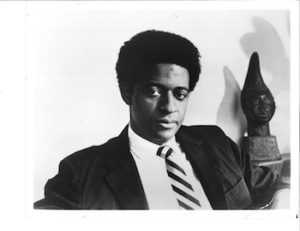
Norman Hill
Norman Hill was born on this date in 1933. He is a Black administrator, union activist, and labor leader.
He received his Bachelor of Arts in Sociology from Summit, New Jersey, from Haverford College in 1956. Haverford (in Pennsylvania) is one of the oldest colleges in America, and Hill was one of their first Black graduates. After finishing military service, he joined the civil rights movement in Chicago and served as Chicago Coordinator. His efforts included Youth March for Integrated Schools; Secretary, Chicago Area Negro American Labor Council; Staff Chairman, Chicago March Conventions; and Secretary of the Chicago Wade-Ins, integrating Rainbow Beach.
Also in the early 1960s, Hill joined the Congress of Racial Equality (CORE), first as East Coast Field Secretary, then as National Program Director from 1961 to 1964. During those years, he coordinated the Route 40 (from Baltimore to Washington, D.C.) restaurant desegregation campaign, the Waldorf Astoria, A&P Stores, and the Trailways Bus Company campaigns. He planned and directed the civil rights demonstration at the 1964 Republican National Convention. Working with Bayard Rustin, Hill built coalitions that mobilized activists from Baltimore, Chicago, Louisville, Cincinnati, Minneapolis, and St. Paul.
He represented James Farmer Jr., the National Director of CORE, on the March on Washington Policy Board. From 1964 to 1967, Hill was a Legislative Representative and Civil Rights Liaison of the Industrial Union Department of the AFL-CIO. He also helped to coordinate Dr. Martin Luther King's six-city 1964 get-out-the-vote tour. He lobbied to increase the minimum wage and was in the labor delegation on the Selma-Montgomery March against racial discrimination in voting in the Deep South. In 1965, Hill was one of the key planners of the Joint Apprenticeship Program, sponsored by APRI and the Workers' Defense League. This was a Recruitment and Training Program dedicated to the interest of minority participation in the building trades and construction industry.
From 1967 to 1974, Hill was Associate Director of the A. Philip Randolph Institute. Here, he helped coordinate the Memphis March at the time of Dr. King's assassination in 1968. Hill became Executive Director of the A. Philip Randolph Institute in 1975. Since 1980, he has served as President of the APRI. Since joining the APRI, Hill has organized over 200 local A. Philip Randolph Institute affiliate chapters in America. Hill serves many community and labor-related organizations.
He served on the Board of Trustees of Freedom House, the National Committee of Social Democrats, USA, the League for Industrial Democracy, Bayard Rustin Fund, and the National Coalition of Black Voter Participation, and he is a member of the Black Leadership Forum and the National Committee on Pay Equity. Hill is a member of the Newspaper Guild, AFL-CIO, and has published articles in such journals as the AFL-CIO News, The New Leaders, and numerous Black publications. He also writes for the Black Labor Agenda.